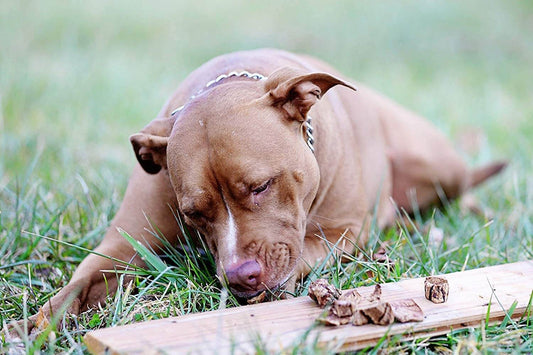
Joint Health for Senior Dogs: A Trip to the Lake
Dawn Miller Dec 18, 20245 Minute ReadThe other weekend, I took my dogs to our favorite lakeside park for a swim. It's a bit of a drive, but it's so worth it to see soaked pups bounding around like they were born for the water. My lab mix, Bruno (6YO) and terrier, Pixie (7YO), are fast approaching senior status. Yet, you’d never guess it watching them chase sticks or wade into the water with all the enthusiasm of puppies.
I credit their vitality to many things—good nutrition, regular exercise, and, of course, the right dog joint supplements and treats. Supporting joint health for senior dogs has been a big focus in my house over the past several years, even though my pups aren't technically seniors yet. My dog friends of years past would have benefited from what I know now. And I've promised my current K9s I'd do better now that I know how to support dog joint health as they age.
Keeping their joints strong and flexible means they can keep enjoying life’s adventures, whether that’s a trip to the lake or a romp in the backyard.
When Is a Dog Considered a Senior?
Dogs are considered seniors when they reach the latter third of their average lifespan. For smaller breeds like terriers, this might be around 10 years old. But larger breeds like labs may enter their senior years as early as 7.
Wow! I don't even like to think about what that says about these dog's average lifespans.
That said, dogs are similar to humans regarding quality of life as they age. Lifestyle factors contribute significantly to lifespan (how long they live) and healthspan (how long they stay relatively active and healthy).
My lab mix Bruno just turned 6. So, he's getting up there. But I don't expect him to wake up at 7 as a sudden senior because he hasn't shown signs of making that transition into a new phase of life—just yet.
So, in addition to age, signs determine if a dog is senior, for example:
- Slowing down on walks
- Needing a bit longer to get up from their beds
- Looking stiff as they stand up
- Not wanting to sleep on a hard floor—who likes that anyway?
- Less enthused when they hear you pulling a bag of treats out of the dog treats cabinet
- Coming to you less often
Why Joint Health Matters for Senior Dogs
While it’s normal for them to mellow with age, maintaining mobility and joint health is essential to stay comfortable and active. Dogs don't have to develop joint issues as they age. And we do them a disservice if we assume it's a natural part of aging.
As dogs and humans age, the cartilage that cushions the bones thins, eventually allowing the bones to touch. This causes stiffness, discomfort, loss of range of motion, and sometimes outright pain. Activities that once came easily—like jumping onto the couch or climbing stairs—can become challenging.
The Benefits of Actively Supporting Joint Health for Senior Dogs
Cartilage thinning can be slowed and even reversed with proper nutrition and care. By providing the right joint health for senior dogs, you can significantly alter how their joints age and:
- Reduce Pain and Inflammation
- Maintain Mobility
- Improve Quality of Life
How To Support Joint Health for Senior Dogs
Supplementation
Joint supplements that contain glucosamine and chondroitin can help repair cartilage, slow its loss and reduce discomfort.
Encouraging Active Aging
Regular movement lubricates joints and enhances nutrient-rich blood flow. This reduces deterioration and keeps the surrounding muscles and connective tissues strong and supple, supporting the joint.
When dogs move comfortably, they’re happier and more engaged. They'll have a better quality of life overall.
Avoiding Toxic Ingredients
Certain preservatives, chemical additives, and even sugar are added to dog treats to make them last longer and taste better to dogs. These can increase rates of inflammation that make joints hurt and hasten wear and tear.
In my mind, if the ingredients don't already taste great to my dogs, then I shouldn't be giving that treat to my dogs.
What to Give Dogs for Joint Health
If you care about dog joint health like I do, there are some key nutrients dogs need. These nutrients aren't prevalent in an all-kibble diet. But the good news is they can each be found in an all-natural, single-ingredient, whole food I'll share with you.
So, no awkward pills or messy droppers. Just joint healthy dog treats that dogs love!
1. Glucosamine and Chondroitin
These natural compounds are the building blocks of cartilage. Glucosamine helps repair and maintain joint tissue. And chondroitin reduces inflammation, which slows cartilage breakdown. Together, they’re a life-changer for senior dogs, promoting joint and overall dog health.
The best all-natural source of glucosamine and chondroitin is cartilage. That's why I give beef trachea treats to my pups at least once weekly. And I started while they were younger because an ounce of prevention is worth a pound of cure.
These healthy dog treats are just chewy cartilage and nothing else. Plus, my dogs love them.
2. Omega-3 Fatty Acids
Found in fish oil, omega-3s have anti-inflammatory properties that support joint health and overall wellness. Omega-3 is one of the essential fats, meaning dogs can't make it internally. But they need it to have a healthy heart, brain, skin, coat—and set of joints.
While I could give them fish oil, those capsules contain additives. I prefer a more natural approach. Marrow-filled dog bones are a great source of omega-3 fats when those bones come from grass-fed herds.
So, on top of beef trachea, I ensure the K9s get their dog bones at least a couple of times a week. One beef dog bone lasts a long time, even with aggressive chewers.
These are the best bones for senior dogs.
All of K9 Connoisseur's dog bones support joint mobility in dogs. Here are some of my K9s' faves.
For small dogs, I recommend K9 Delights. They're compact for little mouths but full of flavor and nutrition. Get the perfect dog bone for little dogs and puppies here.
Medium dogs like my terrier Pixie need something larger so they won't accidentally swallow it. The Dynamo bone is a great choice. Plus, these are very refillable once the marrow's gone. Here are some of my favorite recipes: free bone refill guide.
Then, for my larger lab mix, Bruno, there is so much to love with the Goliath Bone. It's huge and can last, even with his hard bite.
3. Collagen
Collagen is a structural protein. Strong, functional joints start with a latticework of collagen guiding the cartilage-building and restoring process. Fortunately, collagen is found in both beef trachea and grass-fed beef dog bones. So, you've already got them covered.
But if you want to go above and beyond, you should try Beef Lung Training Treats.
You've already heard how nutritious organ meat is. These are simply tried bits of organ meat that dogs absolutely can't get enough of. But of course, with all of these treats, a little goes a long way. So, give in moderation to maximize joint health and dog health benefits of real whole food bones for senior dogs like these.
Available On:





